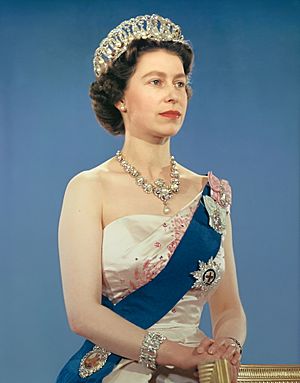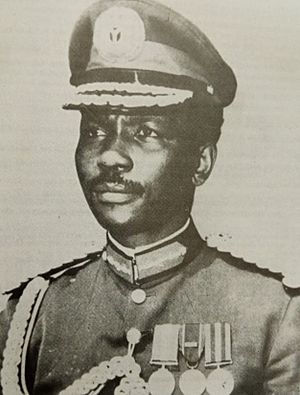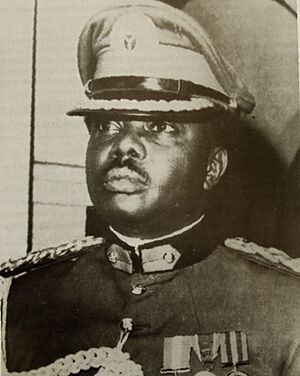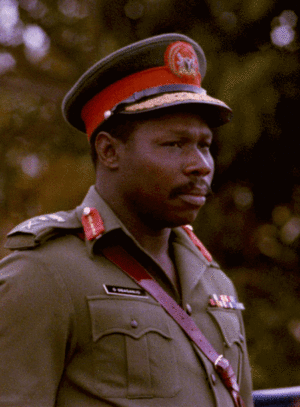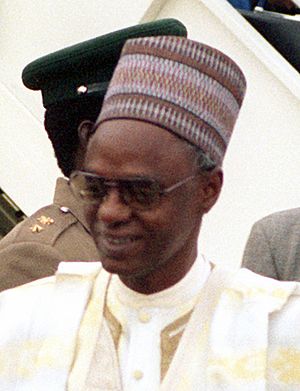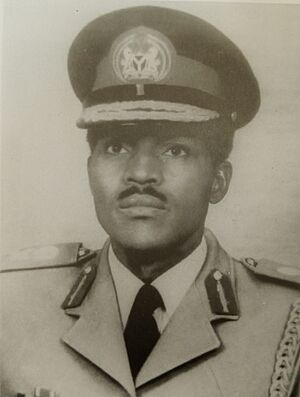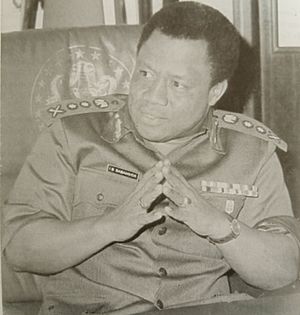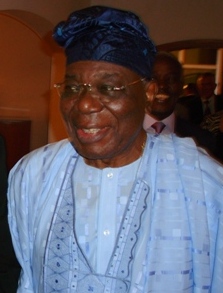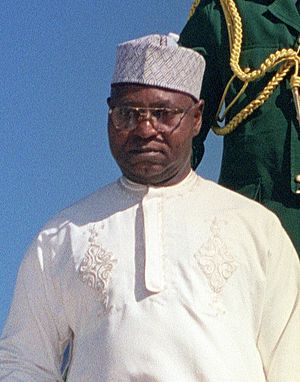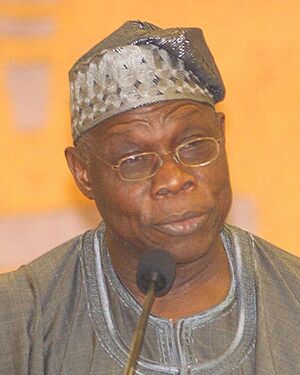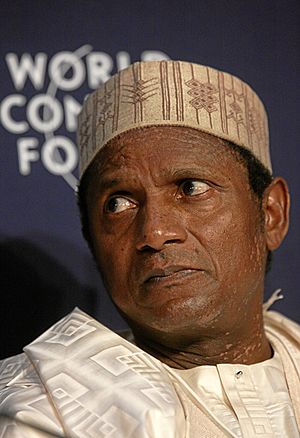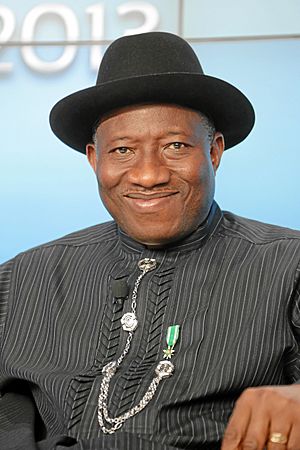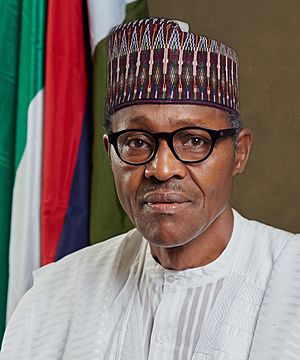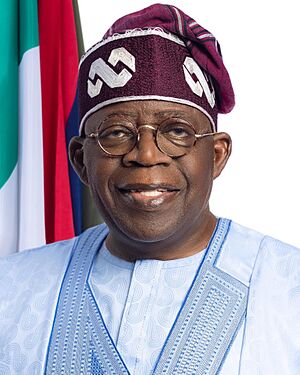List of heads of state of Nigeria facts for kids
This article tells you about the leaders of Nigeria, from when it became independent in 1960 until today. The leader of a country is often called the "head of state." In Nigeria, the President is currently both the head of state and the head of government.
When Nigeria first became independent in 1960, its head of state was Elizabeth II, who was also the Queen of the United Kingdom. She was represented in Nigeria by a special person called a Governor-General. Nigeria became a republic in 1963. This meant the Queen and the Governor-General were replaced by a President. Nnamdi Azikiwe was the first Nigerian Governor-General and later the first President.
Since 1963, 14 different people have led Nigeria. The current President, Bola Tinubu, is the 16th head of state. Some leaders, like Olusegun Obasanjo and Muhammadu Buhari, served two times. They were leaders first as military officers and then later as elected civilians.
Some leaders had very short terms. Ernest Shonekan was in office for only 83 days. Johnson Aguiyi-Ironsi served for 194 days. Murtala Muhammed was leader for 199 days. On the other hand, Yakubu Gowon served for almost nine years straight. Olusegun Obasanjo served the longest in total, for over eleven years across his two terms.
Many changes in leadership happened because of military coups. Five heads of state were removed from power this way. Four leaders died while in office. Two were killed during military coups, and two died from natural causes. Three leaders resigned from their positions.
Contents
Nigeria's First Leaders: The Monarchy (1960–1963)
When Nigeria first gained independence, it was a monarchy. This meant the Queen of the United Kingdom was also Nigeria's Queen.
The Queen of Nigeria
The rules for who would become Queen were the same as for the British throne.
| Queen | Time in Office | Royal Family | Prime Minister | Ref. | ||||
|---|---|---|---|---|---|---|---|---|
| No. | Portrait | Name (birth–death) |
Started | Ended | How Long | |||
| 1 | Elizabeth II (1926–2022) |
1 October 1960 | 1 October 1963 | 3 years | Windsor | Abubakar Tafawa Balewa | ||
The Governor-General
The Governor-General was the Queen's representative in Nigeria. This person had most of the Queen's powers. The Governor-General was chosen by the Nigerian government.
| Governor-General | Time in Office | Monarch | Prime Minister | Ref. | ||||
|---|---|---|---|---|---|---|---|---|
| No. | Portrait | Name (birth–death) |
Started | Ended | How Long | |||
| 1 | Sir James Robertson (1899–1983) |
1 October 1960 | 16 November 1960 | 46 days | Elizabeth II | Sir Abubakar Tafawa Balewa (1912–1966) |
||
| 2 | Dr. Nnamdi Azikiwe (1904–1996) |
16 November 1960 | 1 October 1963 | 2 years, 319 days | ||||
Nigeria Becomes a Republic (1963–Present)
In 1963, Nigeria changed from a monarchy to a republic. This meant it would now have a President as its head of state.
The First Republic (1963–1966)
Under Nigeria's first republican constitution, the country had a parliamentary system. This meant there was a Prime Minister and a President. The President was the ceremonial head of state, while the Prime Minister led the government. The President was elected by the Parliament for five years.
| President | Time in Office | Political Party | Prime Minister | Ref. | ||||
|---|---|---|---|---|---|---|---|---|
| No. | Portrait | Name (birth–death) |
Started | Ended | How Long | |||
| 1 | Dr. Nnamdi Azikiwe (1904–1996) |
1 October 1963 | 16 January 1966 | 2 years, 107 days | National Council of Nigeria and the Cameroons | Abubakar Tafawa Balewa (1912–1966) |
||
Military Rule (1966–1979)
In 1966, a military coup led by Major Chukwuma Kaduna Nzeogwu ended the First Republic. Military leaders then took charge of the country.
| Head of State | Time in Office | Military Group | Ref. | ||||
|---|---|---|---|---|---|---|---|
| No. | Portrait | Name (birth–death) |
Started | Ended | How Long | ||
| 2 | Major General Johnson Aguiyi-Ironsi (1924–1966) |
16 January 1966 | 29 July 1966 (killed.) |
194 days | Central Military Government | ||
| 3 | General Yakubu Gowon (born 1934) |
1 August 1966 | 29 July 1975 (removed from power.) |
8 years, 362 days | Supreme Military Council | ||
| 4 | General Murtala Mohammed (1938–1976) |
29 July 1975 | 13 February 1976 (killed.) |
199 days | |||
| 5 | General Olusegun Obasanjo (born 1937) |
13 February 1976 | 1 October 1979 (stepped down.) |
3 years, 230 days | |||
The Second Republic (1979–1983)
In 1979, Nigeria returned to civilian rule with a new constitution. The President became both the head of state and the head of government. The President was elected for a four-year term.
| President | Time in Office | Political Party | Cabinet | Elected | Ref. | ||||
|---|---|---|---|---|---|---|---|---|---|
| No. | Portrait | Name (birth–death) |
Started | Ended | How Long | ||||
| 6 | Alhaji Shehu Shagari (1925–2018) |
1 October 1979 | 31 December 1983 (removed from power.) |
4 years, 91 days | National Party of Nigeria | Shagari | 1979 1983 |
||
Military Rule (1983–1993)
Another military coup in 1983 brought military rule back to Nigeria.
| Head of State/ President |
Time in Office | Military Group | Ref. | ||||
|---|---|---|---|---|---|---|---|
| No. | Portrait | Name (birth–death) |
Started | Ended | How Long | ||
| 7 | Major General Muhammadu Buhari (born 1942) |
31 December 1983 | 27 August 1985 (removed from power.) |
1 year, 239 days | Supreme Military Council | ||
| 8 | General Ibrahim Babangida (born 1941) |
27 August 1985 | 26 August 1993 (stepped down.) |
7 years, 364 days | Armed Forces Ruling Council | ||
Interim Government (1993)
After some political problems, an interim (temporary) government was set up.
| Interim Head of State | Time in Office | Political Party | Ref. | ||||
|---|---|---|---|---|---|---|---|
| No. | Portrait | Name (birth–death) |
Started | Ended | How Long | ||
| 9 | Chief Ernest Shonekan (1936–2022) |
26 August 1993 | 17 November 1993 (removed from power.) |
83 days | Independent | ||
Military Rule (1993–1999)
Military rule returned again in late 1993.
| Head of State | Time in Office | Military Group | Ref. | ||||
|---|---|---|---|---|---|---|---|
| No. | Portrait | Name (birth–death) |
Started | Ended | How Long | ||
| 10 | General Sani Abacha (1943–1998) |
17 November 1993 | 8 June 1998 (died in office.) |
4 years, 203 days | Provisional Ruling Council | ||
| 11 | General Abdulsalami Abubakar (born 1942) |
9 June 1998 | 29 May 1999 (stepped down.) |
354 days | |||
The Fourth Republic (1999–Present)
Since 1999, Nigeria has been a democracy under its fourth constitution. The President is elected for a four-year term and leads both the country and the government.
| President | Time in Office | Political Party | Cabinet | Elected | Ref. | ||||
|---|---|---|---|---|---|---|---|---|---|
| No. | Portrait | Name | Started | Ended | How Long | ||||
| 12 | Chief Olusegun Obasanjo (born 1937) |
29 May 1999 | 29 May 2007 | 8 years | People's Democratic Party | Obasanjo | 1999 2003 |
||
| 13 | Alhaji Umaru Musa Yar'Adua (1951–2010) |
29 May 2007 | 5 May 2010 (died in office) |
2 years, 341 days | People's Democratic Party | Yar'Adua | 2007 | ||
| 14 | Dr. Goodluck Jonathan (born 1957) |
6 May 2010 | 29 May 2015 | 5 years, 23 days | People's Democratic Party | Jonathan I–II | 2011 | ||
| 15 | Muhammadu Buhari (born 1942) |
29 May 2015 | 29 May 2023 | 8 years | All Progressives Congress | Buhari I–II | 2015 2019 |
||
| 16 | Bola Tinubu (born 1952) |
29 May 2023 | Incumbent | 2 years, 268 days | All Progressives Congress | Tinubu | 2023 | ||
Timeline of Nigerian Leaders
This timeline shows when each head of state served in Nigeria.
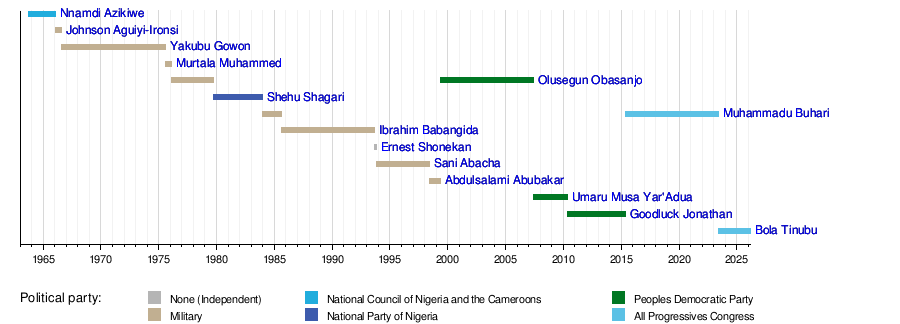
How Long Leaders Served
This table shows how long each head of state served. Remember that some leaders, like Olusegun Obasanjo and Muhammadu Buhari, served two separate times.
| Rank | Head of State | Political Party | Longest Continuous Term | Total Time in Office | Number of Times Served | How Term Ended |
|---|---|---|---|---|---|---|
| 1 | Olusegun Obasanjo | Military/Peoples Democratic Party | 8 years, 0 days | 11 years, 230 days | 2 | Stepped down/Term ended |
| 2 | Muhammadu Buhari | Military/All Progressives Congress | 8 years, 0 days | 9 years, 239 days | 2 | Removed from power/Term ended |
| 3 | Yakubu Gowon | Military | 8 years, 362 days | 8 years, 362 days | 1 | Removed from power |
| 4 | Ibrahim Babangida | Military | 7 years, 364 days | 7 years, 364 days | 1 | Stepped down |
| 5 | Goodluck Jonathan | Peoples Democratic Party | 5 years, 23 days | 5 years, 23 days | 1 | Term ended |
| 6 | Sani Abacha | Military | 4 years, 203 days | 4 years, 203 days | 1 | Died |
| 7 | Shehu Shagari | National Party of Nigeria | 4 years, 91 days | 4 years, 91 days | 1 | Removed from power |
| 8 | Umaru Musa Yar'Adua | People's Democratic Party | 2 years, 341 days | 2 years, 341 days | 1 | Died |
| 9 | Nnamdi Azikiwe | National Council of Nigeria and the Cameroons | 2 years, 107 days | 2 years, 107 days | 1 | Removed from power |
| 10 | Bola Tinubu | All Progressives Congress | 2 years, 268 days | 2 years, 268 days | 1 | Still in office |
| 11 | Abdulsalami Abubakar | Military | 354 days | 354 days | 1 | Stepped down |
| 12 | Murtala Muhammed | Military | 199 days | 199 days | 1 | Killed |
| 13 | Johnson Aguiyi-Ironsi | Military | 194 days | 194 days | 1 | Killed |
| 14 | Ernest Shonekan | Independent | 83 days | 83 days | 1 | Removed from power |
Images for kids
 | Selma Burke |
 | Pauline Powell Burns |
 | Frederick J. Brown |
 | Robert Blackburn |


